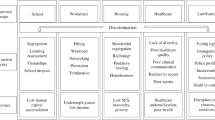Abstract
Sentencing disparity research has generally focused on the Black-white binary or treats Latina/o/x/s as a monolithic group. Less attention has been paid to the ways that diverse racial identities among Latina/o/x/s may correlate with sentence severity. We integrate insights from Latinx studies to examine sentence length disparities in Florida from 2015 to 2017, with a particular interest in comparing the unique effects of Latinidad across varying racial identities. Multiple regression modeling with weighted effect coding is employed to assess prison sentence lengths for 73983 individuals using data from the National Corrections Reporting Program (NCRP). The results demonstrate the need to treat Latina/o/x system-involved individuals as diverse, to integrate insights from Latinx studies in theorizing on related topics, and to identify innovative approaches for accurately capturing these data. The reliance on administrative data limits researchers’ ability to adequately study ethnoracial sentencing disparities.
Similar content being viewed by others
Notes
We use the term “Latina/o/x” throughout this study to engage with the expansiveness and inclusivity of this awkward linguistic signifier. Given our study’s arguments regarding a false monolithic conception of Latinx identities, our use of this term intentionally invokes its challenging of reductive binaries and its attempt to recognize the intersecting identities of the subjects it serves to identify. In addition to accounting for gender and viewing the “x” as a disruption of gender binaries, we echo Ed Morales’s argument in his 2018 book, Latinx, to also emphasize that the “x” may serve to counter and destabilize discourses on race, specifically the persisting reliance in the U.S. on a Black-white binary. For critical discussion on the use of “Latinx,” see the 2017 special issue of Cultural Dynamics, “Theorizing LatinX,” which includes essays by Claudia Milian, Antonio Viego, Patricia Engel, and other authors and theorists of Latinx studies.
Though the roots of “colorism” as a theoretical concept are situated in social scientific research rather than in Latinx studies as a discrete field of inquiry, we find its application here fruitful for arguing against a conception of Latina/o/x/s as a monolith. Perhaps due to the “Latina/o/x” signifier’s complex use as an ethnic category that is also racialized, colorism does not appear to be prevalent within Latinx studies scholarship. We find, however, that the application of “colorism” to Latinx identities is increasing among think tanks, news, cultural commentary, and popular media (e.g., the Pew Research Center, The New York Times, Latino Rebels, Mitú). Therefore, we argue that “colorism” presents a productive point of dialogue between social scientific research and contemporary cultural commentary on Latina/o/x/s in the United States.
References
Baca Zinn, M., & Mirandé, A. (2021). Latino/a sociology: Toward a new paradigm. Sociology of Race and Ethnicity, 7(3), 304–317. https://doi.org/10.1177/2332649220971326
Blair, I. V., Judd, C. M., Sadler, M.S., and Jenkins, C. (2002). The role of Afrocentric features in person perception: Judging by features and categories. Journal of Personality and Social Psychology, 83(1), 5–25. https://doi.org/10.1037/0022-3514.83.1.5
Blair, I. V., Judd, C. M., & Chapleau, K. M. (2004). The influence of Afrocentric facial features in criminal sentencing. Psychological Science, 15(10), 674–679. https://doi.org/10.1111/j.0956-7976.2004.00739.x
Bonilla-Silva, E. (1997). Rethinking racism: Toward a structural interpretation. American Sociological Review, 62(3), 465–480. https://doi.org/10.2307/2657316
Bonilla-Silva, E. (2004). From bi-racial to tri-racial: Towards a new system of racial stratification in the USA. Ethnic and Racial Studies, 27(6), 931–950. https://doi.org/10.1080/0141987042000268530
Burch, T. (2015). Skin color and the criminal justice system: Beyond black-white disparities in sentencing. Journal of Empirical Legal Studies, 12(3), 395–420. https://doi.org/10.1111/jels.12077
Chávez, J. C. (2021). Venezuelans live mostly in Florida and they top Hispanic population growth. Tampa Bay Times, September 25.
Doerner, J. K., & Demuth, S. (2010). The independent and joint effects of race/ethnicity, gender, and age on sentencing outcomes in U.S. Federal Courts. Justice Quarterly, 27(1), 1–27. https://doi.org/10.1080/07418820902926197
Durante, K. A. (2020). Racial and ethnic disparities in prison admissions across counties: An evaluation of racial/ethnic threat, socioeconomic inequality, and political climate explanations. Race and Justice, 10(2), 176–202. https://doi.org/10.1177/2153368717738038
Durante, K. A. (2021). County-level context and sentence lengths for Black, Latinx, and white individuals sentenced to prison: A multi-level assessment. Criminal Justice Policy Review, 32(9), 915–937. https://doi.org/10.1177/08874034211021893
Feldmeyer, B. & Ulmer, J. T. (2011). Racial/ethnic threat and federal sentencing. Journal of Research in Crime & Delinquency, 48(2), 238–270. https://doi.org/10.1177/0011128719839394
Feliciano, C. (2016). Shades of race: How phenotype and observer characteristics shape racial classification. American Behavioral Scientist, 60(4), 390–419. https://doi.org/10.1177/0002764215613401
Fordham, S. (2010). Passin' for Black: Race, identity, and bone memory in postracial America. Harvard Educational Review, 80(1), 4–30.
Franklin, T. W. (2015). Race and ethnicity effects in federal sentencing: A propensity score analysis. Justice Quarterly, 32(4), 653–679. https://doi.org/10.1080/07418825.2013.790990
Franklin, T. W. (2018). The state of race and punishment in America: Is justice really blind? Journal of Criminal Justice, 59(1), 18–28. https://doi.org/10.1016/j.jcrimjus.2017.05.011
Freiburger, T. L. & Jordan, K. L. (2020). The joint effects of race, ethnicity, gender, and age on the incarceration and sentence length decisions. Race and Justice, 10(2), 203–222. https://doi.org/10.1177/2153368717739676
Freiburger, T. L., Jordan, K. L., & Hilinski-Rosick, C. M. (2019). A multivariate analysis of incarceration and sentence length decisions for older defendants. Criminal Justice Policy Review, 30(7), 1064–1085. https://doi.org/10.1177/0887403418765911
Garcia-Hallet, J. (2022). Invisible mothers: Unseen yet hypervisible after incarceration. University of California Press.
Hajime Miyawaki, M. (2016). Part-Latinos and racial reporting in the Census: An issue of question format? Sociology of Race and Ethnicity, 2(3), 289–306. https://doi.org/10.1177/2332649215613531
Hattery, A., & Smith, E. (2018). Policing the Black body: How Black lives are surveilled and how to work for change. Lanham, MD: Rowman & Littlefield.
Hinton, E. (2018). An unjust burden: the disparate treatment of Black Americans in the criminal justice system. Vera Institute of Justice.
Jiménez Román, M., & Flores, J. (2009). The Afro-Latin@ Reader: History and Culture in the United States. Durham, NC: Duke University Press.
Jordan, K. L., & Freiburger, T. L. (2015). The effect of race/ethnicity on sentencing: Examining sentence type, jail length, and prison length. Journal of Ethnicity in Criminal Justice, 13(3), 179–196. https://doi.org/10.1080/15377938.2014.984045
King, R. D., & Johnson, B. D. (2016). A punishing look: Skin tone and Afrocentric features in the halls of justice. American Journal of Sociology, 122(1), 90–124. https://doi.org/10.1086/686941
Lanuza, Y. R., Petersen, N., & Omori, M. (2021). Colorism in punishment among Hispanics in the criminal justice system. Social Problems. Advanced Online Publication. https://doi.org/10.1093/socpro/spab044.
León, K. S. (2021). Latino criminology: Unfucking colonial frameworks in "Latinos and crime scholarship”. Critical Criminology, 29(1), 11–35. https://doi.org/10.1007/s10612-020-09544-y
Lynch, M. (2019). Focally concerned about focal concerns: A conceptual and methodological critique of sentencing disparities research. Justice Quarterly, 36(7), 1148–1175. https://doi.org/10.1080/07418825.2019.1686163
Martinez, B. P., Petersen, N., & Omori, M. (2020). Time, money, and punishment: Institutional racial-ethnic inequalities in pretrial detention and case outcomes. Crime & Delinquency 66(6), 837–863. https://doi.org/10.1177/0011128719881600
Monk, E. P. (2018). The color of punishment: African Americans, skin tone, and the criminal justice system. Ethnic and Racial Studies, 42(10), 1593–1612. https://doi.org/10.1080/01419870.2018.1508736
Morales, E. (2018). Latinx: The new force in American politics and culture. New York: Verso.
Nellis, A. (2021). The color of justice: Racial and ethnic disparity in state prisons. The Sentencing Project. Retrieved June 7, 2022. (https://www.sentencingproject.org/publications/color-of-justice-racial-and-ethnic-disparity-in-state-prisons/).
Nowacki, J. S. (2015). Race, ethnicity, and judicial discretion: The influence of the United States v. Booker decision. Crime & Delinquency, 61(10),1360–1385. https://doi.org/10.1177/0011128712470990
Nowacki, J. S. (2017). An intersectional approach to race/ethnicity, sex, and age disparity in federal sentencing outcomes: An examination of policy across time periods. Criminology & Criminal Justice, 17(1), 92–116. https://doi.org/10.1177/1748895816642502
Smith, J. (2020). Racial threat and crime control: Integrating theory on race and extending its application. Critical Criminology, 29, 253–271. https://doi.org/10.1007/s10612-019-09485-1
Spohn, C., & Holleran, D. (2000). The imprisonment penalty paid by young, unemployed Black and Hispanic male offenders. Criminology, 38(1), 281–306. https://doi.org/10.1111/j.1745-9125.2000.tb00891.x
Steffensmeier, D., & Demuth, S. (2000). Ethnicity and sentencing outcomes in U.S. federal courts: Who is punished more harshly? American Sociological Review, 65(5), 705–729. https://doi.org/10.2307/2657543
Steffensmeier, D., Kramer, J., & Streifel, C. (1993). Gender and imprisonment decisions. Criminology, 31(1), 411–446. https://doi.org/10.1111/j.1745-9125.1993.tb01136.x
Steffensmeier, D., Ulmer, J. T., & Kramer, J. (1998). The interaction of race, gender, and age in criminal sentencing: The punishment cost of being young, Black, and male. Criminology, 36(4), 763–797. https://doi.org/10.1111/j.1745-9125.1998.tb01265.x
Steffensmeier, D., Feldmeyer, B., Harris, C. T., & Ulmer, J. T. (2011). Reassessing trends in Black violent crime, 1980–2008: Sorting out the ‘Hispanic effect’ in Uniform Crime Reports arrests, National Crime Victimization Survey Offender estimates, and U.S. prisoner counts. Criminology, 49(1),197–251. https://doi.org/10.1111/j.1745-9125.2010.00222.x
Steffensmeier, D., Painter-Davis, N., & Ulmer, J.T. (2017). Intersections of race, ethnicity, gender, and age on criminal punishment. Sociological Perspectives 60(4), 810–833. https://doi.org/10.1177/0731121416679371
Tabb, K. M. (2016). Changes in racial categorization over time and health status: An examination of multiracial young adults in the USA. Ethnicity & Health, 21(2), 146–157. https://doi.org/10.1080/13557858.2015.1042431
te Grotenhuis, M., Pelzer, B., Eisinga, R., Nieuwenhuis, R., Schmidt-Catran, A., & Konig, R. (2017). A novel method for modeling interaction between categorical variables. International Journal of Public Health, 62(3), 427–431. https://doi.org/10.1007/s00038-016-0902-0
The Center for Puerto Rican Studies (Centro). (2017). Puerto Ricans in Florida, 2015. New York: Hunter College, The City University of New York.
Ulmer, J. T. (2019). Criminal courts as inhabited institutions: Making sense of difference and similarity in sentencing. Crime and Justice, 48, 483–522. https://doi.org/10.1086/701504
Unidos US Blog. (2019). Afro-Latinos are part of the American story. Retrieved March 10, 2022 (https://www.unidosus.org/blog/2019/02/26/afro-latinos/).
United States. Bureau of Justice Statistics. (2018). National Prisoner Statistic, [United States], 1978–2018. Codebook. Inter-University Consortium for Political and Social Research. Ann Arbor, MI.
United States. Bureau of Justice Statistics. (2019). National Corrections Reporting Program, [United States], 2000–2017. Inter-university Consortium for Political and Social Research. Ann Arbor, MI.
Urban Institute. (2016). The alarming lack of data on Latinos in the criminal justice system. Retrieved July 11, 2022 (https://apps.urban.org/features/latino-criminal-justice-data/).
Urbina, M. G. (2007). Latinos/as in the criminal and juvenile justice systems. Critical Criminology, 15, 41–99. https://doi.org/10.1007/s10612-006-9018-9
Wooldredge, J., Frank, J., Goulette, N., & Travis III, L. (2015). Is the impact of cumulative disadvantage on sentencing greater for Black defendants?” Criminology & Public Policy, 14(2), 187–223. https://doi.org/10.1111/1745-9133.12124
Author information
Authors and Affiliations
Corresponding author
Additional information
Publisher's Note
Springer Nature remains neutral with regard to jurisdictional claims in published maps and institutional affiliations.
Rights and permissions
Springer Nature or its licensor (e.g. a society or other partner) holds exclusive rights to this article under a publishing agreement with the author(s) or other rightsholder(s); author self-archiving of the accepted manuscript version of this article is solely governed by the terms of such publishing agreement and applicable law.
About this article
Cite this article
Durante, K.A., Trocchio, S. & Martínez, C. Doomed by the Data? Latina/o/x Racialization and Sentencing Outcomes in Florida. Crit Crim (2024). https://doi.org/10.1007/s10612-024-09766-4
Accepted:
Published:
DOI: https://doi.org/10.1007/s10612-024-09766-4




